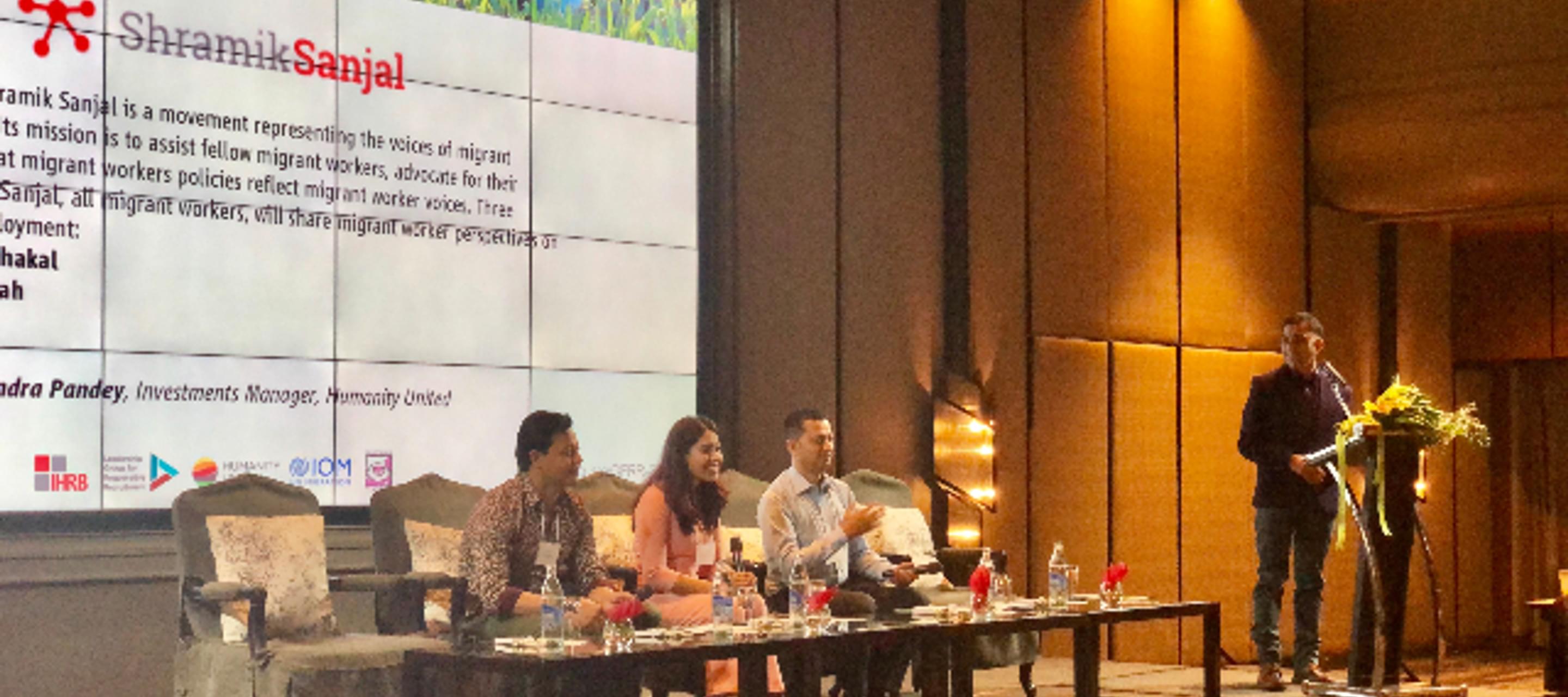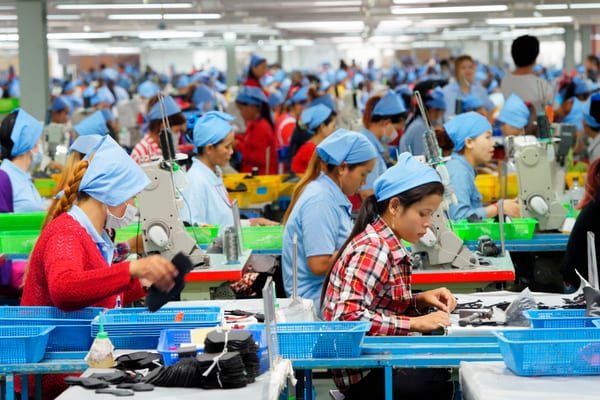Shramik Sanjal - Findings from a Survey of Nepalese Migrant Workers
10 July 2019

The third annual Global Forum for Responsible Recruitment took place this week in Bangkok, Thailand. Among the participants are a group of migrant workers from Nepal who work to assist fellow migrant workers, advocate for their rights, and ensure that migrant workers policies reflect migrant worker voices. They shared with participants, and reproduced below, their recommendations based on a survey of workers.
Context
Human beings cannot be traded like commodities, yet they are trafficked and exploited in various ways in the supply chains of global businesses. Issuing a contract and getting it signed or approved by workers may be easy, but, when based on false promises, the consequences can be real and lasting for workers with few options or power in negotiation.
As a result of globalisation, the economic development of one side of the globe is booming, but only by commoditising the human capital of another part of the very same world. This is a common phenomenon, and so there must be a level of governance and scrutiny of global recruitment to check and balance the unnatural way humans are treated as goods in the global economy.
Due to the lack of job opportunities and few economic prospects in Nepal, thousands of Nepalese youth leave the country every day as migrant workers seeking to make a better living in various countries—mostly migrating to the Middle East and Malaysia. These migrant workers are often hired through unofficial recruitment agencies that take advantage of their dreams by making false promises and engaging in unethical practices (e.g. fake contracts, charging heavy recruitment fees, etc.)
These unethical recruitment agencies also confiscate passports and other important documents from potential migrant workers as well as charge additional heavy fees to “secure and process” the job post. These practices leave workers trapped in debt and turn demands for work into a business predicated on abuse. Hence, the higher the demand for work, the higher the fees that are charged. The higher the fees, the higher the profit for the recruiter, and the higher the interest rate charged by money lenders. In the end, workers are trapped - the entire recruitment system works in a vicious cycle that needs to be broken to create better outcomes for workers.
Background and Objectives
In 2019, Shramik Sanjal conducted a survey to understand the contemporary pattern of recruiting Nepalese migrant workers by employers in the Middle East and to provide an analysis of how recruitment fees affect their living standards and livelihoods. Charging recruitment fees to the migrant workers is one of the major causes of forced labor in global supply chains and business operations. The intent was to have the survey findings become a source of recommendations for the business community based on migrants’ experiences and to promote accountable and responsible businesses by putting workers’ humanity at the core of business operations.
This survey looked at the common trend of recruiting migrant workers in the construction and facility management industries through individual interviews with around 100 current Nepalese migrant workers from more than 30 companies who have been working in the Middle East between five months and five years. The data and information gathered are based on past incidents and the true personal experiences of the respondents.
Key Findings
A. Country of Origin
- Nepalese migrant workers are being charged hefty recruitment fees in their country of origin by manpower agencies. Many are charged $1,000 to $1,500 for cleaning or construction jobs and between $1,500 to $2,000 for security guard roles.
- Recruitment agencies and the agents who work for them often exploit the dreams of potential workers to then trap them by making false promises and charging recruitment fees. It is common for recruitment agencies to hire agents from local villages who have influence in their communities. Those agents often visit the village to target potential members and offer jobs. The majority of the survey respondents shared that they were provided fake contracts before they submitted their documents for their job placement to be processed.
- Workers secure money to pay recruitment fees from local money lenders at a high interest rate of as much as 36% p.a. and oftentimes put their own properties down as collateral.
- Workers were instructed not to share actual/factual information about recruitment fees paid with the government of Nepal, the employment policy, and/or the employer in the county of destination or their job would be withheld. A respondent shared that his recruitment agency made a fake video interview of him to be shared with employers in destination countries. In the video he was asked to praise his hiring process and state he had only paid a recruitment fee of NRS 10,000 ($100) when in reality he had paid approximately $800 to $1,000.
- False worker contracts have been developed to align with local legislation and policy for official government processing. (i.e. the employer should provide minimum wages of QAR 900 + 200 [QAR 900 base pay, QAR 200 food allowance] to obtain the work permit in the country of origin), but the actual minimum wages of the respondents are QAR 700+200 or QAR 800+200.
- The recruitment fees charged vary from person to person and are based on the nature of work and future wages - the higher the wages, the higher the recruitment fees. Indoor work and security guard jobs charge more than outdoor and construction jobs. Security guard and driver jobs are paid slightly higher than construction work. Indoor jobs are less risky than outdoor jobs. The majority of the respondents shared that their first choices of work were either cleaner, office boy, or office helper, which are less physically demanding and lower risk than outdoor construction jobs, which can be life threatening. Since demand for indoor work is high, recruitment agencies and sub agents may demand more fees for the option but often assign workers to any job available, as long as they are able to fulfill their client’s demand.
B. Country of Destination
- At a minimum, one month or two months of worker salaries are retained by the employer.
- One out of 10 workers’ passports were retained by the employer.
- Workers are required to work a minimum of two hours of unpaid overtime per day. Workers are not provided documentation showing that they worked 10 rather than eight hours per day. These unpaid, overtime hours are often pre-determined and approved by the workers' line managers in advance.
- The living conditions of workers are very poor; workers live in shared accommodations where one room is shared among six to 10 people and their personal belongings and documents are not secure.
- Most of the companies don't provide three meals a day and a food allowance. Generally, QAR 200 is not sufficient to afford even basic food items for the entire month. In fact, additional food costs will be deducted from the payroll if the employer provides a prepared meal.
- 95 out of 100 Nepali workers in Qatar did not receive the legislated minimum wage of QAR 1,000/mo.
- On average it takes workers one year to repay recruitment fees.
- Workers employed at small-scale companies are more vulnerable and have been penalised for reporting grievances to human resources (HR) for unwanted overtime work.
- Facility management companies (cleaning and maintenance jobs), often having a smaller workforce, require workers to work extra, unwanted overtime hours (up to 16 hours of continuous work in a day). This is due to understaffing and the standard requirement for unpaid overtime.
Recommendations
- Multinational companies and corporations that have branches in the Middle East hire workers from South Asia, including Nepal, India, and Pakistan. Generally, HR and operations managers who are responsible for recruiting workers are from the same region as the people they are recruiting. These HR managers have connections with the recruitment agencies in the country of origin and select a recruiter where they have a connection, sometimes receiving a bribe or kickback. Businesses need to ensure that the issuance of demand letters is not subject to ‘fees’ but is rather based on a transparent and fair procurement process that ensures responsible recruitment. One approach would be for multinationals and corporates to develop a mechanism to train and develop their HR or talent acquisition teams to be more accountable, transparent, and fully responsible through governance.
- The majority of the Nepalese workers in the Middle East are from the rural villages of Nepal and lack local and international language education, skills, and experience, and generally perform unskilled and low wage jobs. They don't have access to information and hence don't know even the basic provisions of law that protect workers' rights. But they deserve to have access to this information. To protect our right to information, we believe that the recruitment company and the employer should develop a basic information pack or workers’ guidebook and ensure that workers are provided this information by making resources available to the labor desk, office of manpower companies, HR administrative office, in accommodations, as well as publishing the Employer Pays Principle on their official website, social media, and other mass media.
- We often hear from migrant workers that the company they are working for is a “small company” or a “big company.” However, they don’t have an actual basis of assessing the scale of the business. Scaling the size of business on the basis of capital investment, the number of employees, and number of projects underway can help better identify where the problems are occurring, how they are impacting workers, and help determine common patterns to diversify focus areas and develop more problem-centric solutions.
- Multinationals and corporations must choose responsible business partners in their supply chains. They should clarify and share with partners, including with migrant workers directly, the mechanism that they have adopted to ensure that everyone involved in the business and its supply chain is responsible.
- To ensure that employers have paid for the cost of recruitment, multinationals and corporates should require suppliers to provide receipts or other paperwork that proves such payments were made.
About Shramik Sanjal
Shramik is a Nepali word which means “worker”, whereas Sanjal is a Nepali word which means “network”. Shramik Sanjal, therefore, means a workers’ network or a network of workers.
Shramik Sanjal is a voice advocating for dignity and fairness for millions of Nepalese migrant workers, most of whom are low-income migrant workers in Gulf countries and Malaysia. Founded in 2016, Shramik Sanjal works to promote respect, recognition, and inclusion in labor migration. In 2018, Shramik Sanjal launched their network membership, which provides benefits, training, and community to migrant workers abroad. The network has 25 robust chapters and 500 members in GCC and Malaysia.



